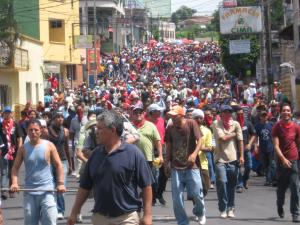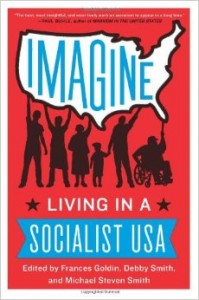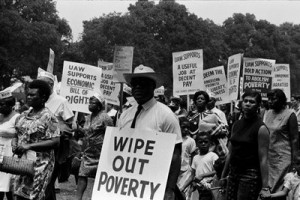Podcast: Play in new window | Download
Updates:
- The Intercept: Snowden Documents Reveal Covert Surveillance and Pressure Tactics Aimed at WikiLeaks and Its Supporters.
- Michael Ratner: The Man Hunting Timeline
- NSA Had Monitored Wikileaks Online Visitors Building Metadata Tree
- Malicious Foreign Actor Document
- NSA Oks Economic Spying On Lawyers Giving Legal Advice To Indonesian Trade Deals
—-
The Drug War: Policing and U.S. Militarism at Home and Abroad
Last week the Center for Constitutional Rights hosted an event titled The Drug War: Policing and U.S. Militarism at Home and Abroad. We’re joined by one of the panelists David Vivar, he’s an author and scholar at National Autonomous University of Honduras at the Faculty of Political Science and International Relations of the University of Calabria. His work focuses on the U.S. cooperation in the Honduran military coup of 2009 and the centrality of drug trafficking to state power in Honduras. What you will hear in this interview is that the U.S. Drug War has not only fueled mass incarceration and discriminatory policing practices here in the U.S. but also supports violence and militarization throughout Latin America. We get the details of that and David’s strategies to resist the racist, and devastating war.
- It’s been constant that Congress asks to stop human rights violations.
- This goes all the way back to the simulation of the rule of law, to a democratic state.
- We have the highest murder rate in the whole world, and we have no war, not a consistent war declared except the war on drugs.
- We’re fighting a war that has turned the current conditions into a civil war.
- When you start having conflicts between drug lords, Mexican cartels and Colombian cartels – what do they do? They go to the space right in the middle, which is Central America and the northern triangle.
- Guatemala, Honduras and El Salvador have seen the consequences. We are the collateral damage.
- 79 percent of the cocaine that travels to the United States goes via Honduras. Basically what the Department of State is doing is investing money on kingpins and drug lords in the Honduran institutions.
- After the coup the military took back power and the U.S constantly supported this new democratic military civil alliance, which in the hand is what happened in Mexico.
- The (Honduran) military has drug lords of its own.
- Miguel Facusse is the most powerful man in Honduras. He’s got the Dinan Corporation which has African Palm plantations throughout the whole drug path.
- Basically the conflict around land is a failed agrarian reform.
- You have indigenous populations that lost their land. Their land was given to this man. The most powerful person, he gets the African Palm plantations which is the best place, as we know from wikileaks to establish small airports for aircraft to land there and deal with the drugs.
- The resistance is still in the streets against a lot of laws – the opening for business of the country – model cities and charter cities are something we’re fighting back in keeping our resources ours.
- The U.S. did cut off military aid for a short amount of time directly after the coup but instead of backing the movement from the Honduran civil society for reinstatement of President Zelaya – throughout that summer and fall there was a huge movement, the streets were filled with people calling for the reinstatement of their president – the United States instead pushed for new elections that fall which was what ended up happening.
- The elections were heavily boycotted by civil society yet the U.S. was the primary force in the region for supporting those elections.
- After those elections took place and Pepe Lobo is elected as president, the U.S. reinstated their support for the Honduran military and police, despite massive human rights violations that were taking place on an almost daily basis.
- You really have a very close relationship between the Honduran military and police and the U.S. government and military.
- There have known to be drug planes that have landed on his property (Miguel Facusse) We know that the U.S.State Department knows about that because of wikileaks and the U.S. goes on to have this cozy relationship with him and the political arm of Honduras that he runs in.
- The World Bank continues to fund him and give him subsidies for the African Palm plantations. Where is the interest in stopping the drugs if you’re working with this person who there are drug planes landing on his property.
- He has a private army basically. He has all these private security contractors that implicated in murders. The Center for Constitutional Rights has laid those out in a report to the International Criminal Court, naming Miguel Facusse as a criminal that needs to be prosecuted.
- The U.S. depends on the Honduran government to have a very friendly government in the region. We have a lot of military presence there, we have a lot of bases. It’s a relationship that depends on the repression of civil society throughout Honduras.
- There’s a massive resistance movement that has taken a lot of repression in the last four years. What’s going on with the drug wars, its very dark and scary but the other side is this movement that David is part of.
Guest – David Vivar, is a sociologist, currently a scholarship holder from the National Autonomous University of Honduras at the Faculty of Political Science and International Relations of the University of Calabria, where he studies dependence, international asymmetry and the division between center and periphery nations. His articles and essays analyze media discourse and public opinion; the representative intermediations of Honduran democracy, the influence of U.S. cooperation in the military coup of 2009 and the centrality of drug trafficking to state power in Honduras and its inextricable relation with the neoliberal impoverishment and the ongoing usurpation of democracy.
Guest – Laura Raymond, has over fourteen years of experience organizing, writing, and advocating on social justice and human rights issues in the U.S. and internationally. Much of Laura’s work focuses on the impact of U.S. actors, corporations and government policies and practices abroad.
—–
Imagine: Living In A Socialist U.S.A – Kazembe Balagune
In the past weeks we’ve featured contributors to the book Imagine: Living In A Socialist U.S.A. This book as many know was conceived and edited by Frances Goldin and our own Michael Smith with his wife Debby. We continue to discuss the essays in this ground breaking anthology. Today we speak with Kazembe Balagun, who wrote We Be Reading Marx Where We From: Socialism and the Black Freedom Struggle.
Kazembe Balagun:
- The chapter starts out with a short story on Paul Robeson at the Carnegie Hall in 1957. He sang a song called I Dreamed of Joe Hill last night.
- When we talk about Wall Street, the first commodity were Black slaves. The reason they called it Wall Street is to keep the Native Americans out.
- There’s always been an interweaving of Black freedom struggles in the socialist experience.
- One of the first socialist experiments happens in the Sea Islands of South Carolina and Georgia where General Butler issuing Article 15 calling for all land held in common for negros.
- Then you have John Brown issuing an alternative constitution of the United States which calls for all land to be held in common between blacks and whites.
- Martin Luther King Jr (in a speech said) there has to be some form of socialism in the United States in order to achieve economic democracy.
- The Poor People’s march going forward in 1968 in his fight for Memphis, these are all parallels for economic democracy.
- What we find today is that these socialist ideas are prevalent in the African-American community.
- I think there’s a way we can excavate this history for our own social movement.
- This capitalist society really has little to offer people, particularly young people of color.
- I always take into account is that there’s always been a tradition of African-American prophetic tradition which always looks beyond what’s been given to us and looks at the condition of possibility.
Guest – Kazembe Balagun, an activist and cultural organizer from the Bronx and former program director at the Brecht Forum. He is currently the project manager at the Rosa Luxemburg New York Foundation.
———————————————————


